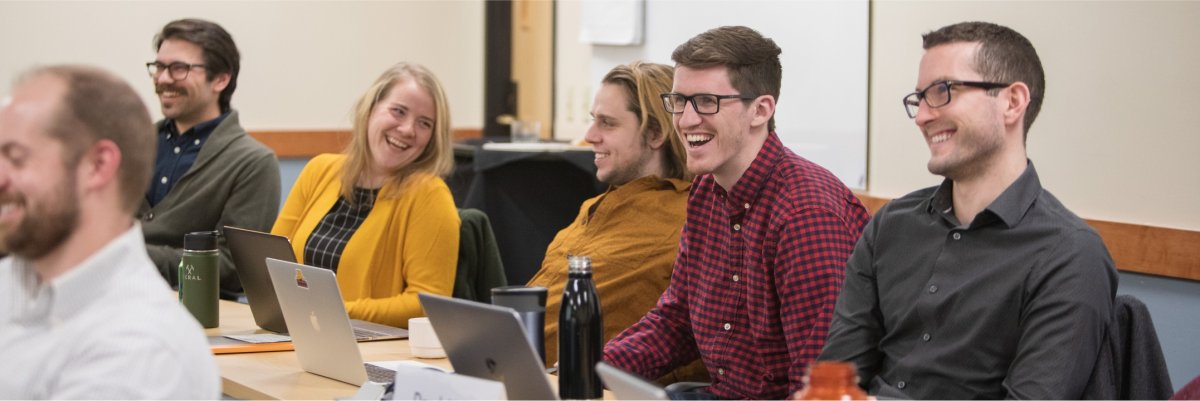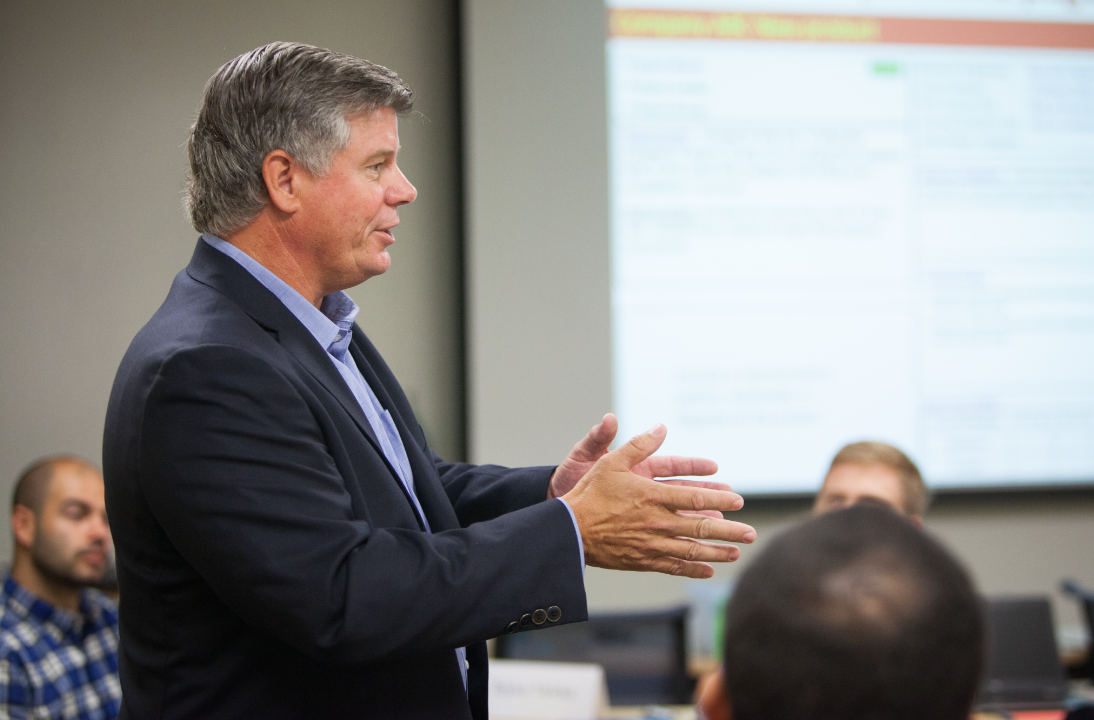Management of Technology Curriculum
Education for Technology Leaders

The 32 credits Management of Technology curriculum comprises a number of carefully selected topics and courses for this Master of Science degree program. The curriculum is a combination of the technology, business and leadership knowledge needed to be a successful technology leader. Throughout the program, students learn tools and techniques from industry experts that can be applied immediately in their own work as well as prepare them for leadership careers in technology at all levels—whether those careers are in information technology and systems, manufacturing and supply chain, research and development, technical marketing and operations, or other technology-intensive sectors.
As keeping pace with today’s technology and business is critical, the curriculum is updated often to incorporate new developments in technology management, innovation and leadership. Classes meet one day per week, alternating Fridays and Saturdays over four semesters, allowing students to graduate in less than two years while continuing to work full time.
MOT Course Categories
Technology Management Courses: The pace of change in technology is accelerating. The technologies applied in different industries today, emerging technologies and their prospective evolution, processes for developing new products and services, effective approaches for managing technology programs and portfolios, intellectual property management, and innovating in small and large companies, are essential learnings and skills for technology leaders. These courses teach students tools and frameworks for all aspects of managing technology in the business context.
Business Foundation Courses: Effective technology leaders must have a firm grasp of business fundamentals. These include accounting and finance, marketing from both strategic and tactical perspectives, operations management, and “future-proofing” a business in a competitive environment. The MOT business foundation courses are relevant for students with background and interest in for-profit and/or nonprofit companies.
Technology Leadership Courses: Effective technology leaders must understand their and others’ leadership styles, and they must be proficient in communicating with and motivating their teams, exercising influence across their larger organizations and beyond, dealing with organizational challenges and conflict, and becoming change agents for driving high performance. Policy and regulations are becoming increasingly crucial in technological domains too, and ethical leadership is a universal imperative. Overall, these courses enable students to develop a holistic leadership mindset that encompasses strategy and execution for technology organizations.
Synthesis Courses: The “synthesis” courses, offered in the last year of the MOT program, help students integrate their learnings in new contexts. Although many other courses in the curriculum refer to global issues and opportunities, specific courses targeted to the international context are offered here, including an international trip. Another highlight of the curriculum is a capstone project that students design and complete, bringing the knowledge they have gained during the program to pursue an opportunity in their organization or industry, or a personal passion.
See curriculum below
+
Term 1 - Fall: Foundations & Exploration
MOT 5010 Enhancing Technology Leadership Skills (2 credits)
This course focuses on preparing students to be leaders in the technology industry, with a focus on understanding their personal values, emotional intelligence strengths and challenges, business and technical communication, persuasion, personal management, and impact. Critically important to success is demonstrating executive presence and gravitas when dealing with all levels of the organization - staff, leaders, and customers. Organizations, team responsibilities, and roles are constantly evolving, and it is up to savvy technology leaders to be future-focused - anticipating and understanding what the organization needs today - and what it will need to grow, and change driven by the business strategies. A technology leader must be a strategic thought leader, a catalyst for change, and think through innovative and values-driven strategies for their work and their organizations.
MOT 5012 Understanding Technology of the Future (2 credits)
This course is designed to give students knowledge and skills necessary to be successful technology leaders in a variety of business settings and industries. Technology leadership begins with the understanding of what new and innovative technologies are being developed around them. But it is also important for leaders to be able to understand if those technologies are relevant and important for their business. Technology leaders need to work collaboratively with other business leaders to ensure new technologies are grounded in business strategies and understand what the company can leverage.
MOT 8112 Accounting and Financial Management for Technology-Based Organizations (2 credits)
Exploration of management accounting as an information framework to organize, evaluate and report proprietary data in order to evaluate a firm's sustainable advantage in competitive tech markets. Adopts a case-driven approach to discuss how this data can be used for strategic decision making for the firm.
Strategies that enable technology-intensive companies to reinvent themselves. Introduces a formula for a sustained competitive advantage that starts with external and internal analysis and proceeds to action items for companies to change their corporate, global and innovation strategies. A rich cadre of case-study examples is reviewed.
+
Term 2 - Spring: Application & Mastery
MOT 5009 Communication for Technology (2 credits)
In the rapidly evolving domain of technology, effective communication stands paramount for technological leaders. This course focuses on developing foundational and advanced communication strategies, underscoring the importance of clear, impactful, and influential communication. Recognizing the myriad challenges and nuances of communicating in a technological environment—from risk assessment to executive decision-making—the curriculum provides a holistic exploration of theories, practices, and real-world applications. Through a combination of case studies, hands-on exercises, theoretical insights, and practical application, students will be equipped to navigate various communication scenarios as they prepare to lead, influence, and drive success in diverse technological settings.
MOT 8115 Data Analytics for Technology Leaders (2 credits)
This course provides a foundational, but not too technical, understanding of how industry leaders can harness the power of data analytics to improve business decisions. We will take a holistic view of what it takes to create a data-driven organization to compete in the digital age - technology infrastructure, data-informed strategy, data analytics expertise, processes for data governance and analytics project ideation, analytics impact evaluation and continuous improvements, etc. Through a mix of case studies, examples, and design sprints, students will learn to identify business problems that can be addressed with data analytics and create a roadmap for solving them.
MOT 8214 Technology Foresight and Forecasting (2 credits)
Examination of tools and techniques for strategic foresight and forecasting of technology deliverables. Applies tools and concepts to critical decision-making for corporate and organizational strategy. Topics include technology analysis, dynamics, evolution, management and resource allocation.
MOT 8221 Program/Project Management (1.5 credits)
Effective project management principles to support both core operations and innovation growth. Emphasizes practical application for effective project delivery. Knowledge management features a conceptual framework for evaluating knowledge assets.
+
Term 3 - Fall: Innovation & Vision
This course will provide the student with a blueprint for creating and maintaining a technical workforce that is high-performing and diverse, helping students become technical leaders that can effectively lead a transformation to support business strategies. This course will provide the tools and context to ensure the technology leader is creating and sustaining a culture of innovation, accountability, and creativity.
MOT 8113 Operations Management for Competitive Advantage (1.5 credits)
Overview of the relationships between supply chain and operations with other functions. Analyzes the impact of process, people and technology on supply chain and operations within manufacturing and service environments.
MOT 8212 Developing New Technology Products and Services (2 credits)
Exploration of how firms select, evaluate and launch new technology products and services (including product modifications). Dissects the strategic components behind new product decision-making, supported by fact-based tools and principles.
MOT 8234 MOT Capstone Project (0.5 credits)
Practical project applying MOT concepts and methods to an opportunity in the student's workplace. Consultation by faculty advisors, under nondisclosure agreements where needed. Recommendations and action plans generated. Immediate ROI for students and employers.
+
Term 4 - Spring: Integration & Leadership
Understanding innovation's role as the primary driver of business success. Critical analysis of innovation drivers includes: building organizations for sustained innovation, digital and large-scale transformation, bringing ideas to market in existing businesses and new ventures, and measuring and enhancing the innovation ecosystem.
MOT 8234 MOT Capstone Project II (1.5 credits)
Practical project applying MOT concepts and methods to an opportunity in the student's workplace. Consultation by faculty advisors, under nondisclosure agreements where needed. Recommendations and action plans generated. Immediate ROI for students and employers.
MOT 8920 Science and Technology Policy (1 credit)
Overview of the role of government and the influence of companies and individuals related to science and technology policy. Reviews and evaluates current and proposed regional, national and global technology-related public policies.
MOT 8921 Global Management of Technology (2 credits)
Two-week international residency. Visits technology-intensive local and U.S.-based companies. Meet with company executives, entrepreneurs, government officials and university faculty. Explore social, economic, cultural and governmental influences on international business.
MOT 8940 Managing Intellectual Property (1 credit)
Managing technology by protecting intellectual property rights. Analyzes various intellectual property areas—patents, copyrights, trade secrets, publications, etc.—and the protection afforded by each. Leverages protection strategies based on company culture, market pace and technology maturity.
*For MOT students enrolled in 2023, click here for curriculum. For MOT students enrolled in Fall 2022, click here. For MOT curriculum for Fall 2021 or before, click here.
MOT Capstone

One of the final courses in the Management of Technology graduate program is the MOT capstone. Students collaborate with a corporate mentor and faculty advisor for this work-based research project to come up with a topic beneficial to business. Capstones also identify and address an industry-based topic such as:
- A general business challenge or opportunity
- A new revenue stream or business venture
- Project management
- Technology products or processes
This work-based research project includes scoping, analysis, development of options, recommendations and implementation approaches. A formal presentation to the capstone faculty committee is required. Employers of TLI students often tell us that the value generated by their students’ capstone projects exceeds the program cost. Some examples of recent capstone projects are:
- A Business Opportunity for Delivering Telemedicine to the Rural Market in the United States
- Identifying Ways to Break Borders with Global Product Offerings
- Bring a Virtual Market Concept to Life
- Humanizing the Knowledge Workers for Sustainable Competitive Advantage
- Identifying and Synergizing Clean Energy Technologies
Review the MOT program requirements and scholarship opportunities, then CONNECT WITH OUR ADMISSIONS TEAM to learn how this program can help advance your career.